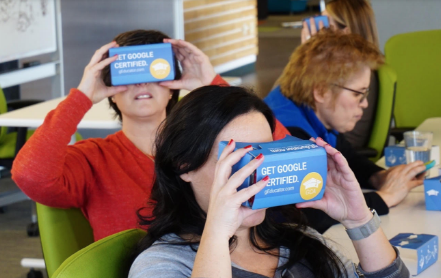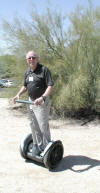As you watch the video consider and make notes on how it relates to the more general findings from the broader research literature discussed earlier.
Also consider the following questions:
- Is the message being presented in this visual way any different from the primarily text-based presentation of findings used so far this week?
- How important is the medium and the technologies themselves in terms of conveying messages about this research area?
- What are the implications for your own practice?
Catchy music. Well exectued. Memorable. Viral.4.5 million views to date.
The execution is persuasive; this is how advertisers do it. You have a message, you find a director who knows how to put it over in way that works.
I've done this myself a few times.
The music is crucial and often not considered in the budget.
Library music might, but rarely works.
Far better to pay for a peice to be composed; I have worked with plenty of student composers who've created a terrifc mood, what I wanted, cued to a click track and the images on the screen. I've also used copyright music and begged persmission from composers, such as some Michael Nyman music I wanted to use.
As a teaser or catalyst at the start of a week (or module,or course) this kind of thing is fantastic, but it is a trailer ... it is not an objective report. The music dictates how the director wants us to think.

These underviewed clips could do with a bit of TLC.
I also need to afford to have them transferred to a higher defintion.
Here's a simply exercise to demonstrate who the music skews the mood, impact and desire outcome; turn off the sound and play the video to 'Anarchy in the UK' the Sex Pistols, or 'She's Like a Rainbow' Rolling Stones. Do you feel so sympathetic now?
Is not this the kind of music played to claw at our heart strings when our charity is being requested to house the homeless and feed the poor?
If you think you can turn a report or piece of research into an objective and compelling piece of TV you are wrong
a) There must be a narrative
b) There is a need for conflict
c) Controversy helps
A polite debate to a live audience that gets out of hand does the trick, but this is hardly the Jeremy Kyle show.
Increasingly, though my background is the spin of advertising and stakeholder communications, I want to learn how to research and present sound, objective facts - the kind of evidence upon which people can act on the basis that the thoroughness and professionalism of the approach has isolated the problems which others can then address.
The nonsense spoken about 'The Net Generation' et al. implies that arming one cohort with laptops (a 1999s thing), now with tablets (preferably an iPad) will deliver.
This ain't how it happens. Never has with technology and never will.
Were I the Headmaster of a school I'd want to see technology used to play to the strengths of the subject being taught.
In art classes and music they are going to get a pad of A3 cartridge paper, some soft pencils, putty rubber and a knife; in music they're going to get an 'unplugged' music instrument to master.
In Chemistry they can have a white board that shows interactive animations of chemical processes taking place in what would otherwise be dangerous experiments.
In H807 I bemoaned the fact that I wasn't being hit with the kind of gizmo-worlds I'd been brought up to create for corporate clients - they want to see their money on the screen. We 'read' for the Masters in Open and Distance Education. When faced with a video, if a transcript isn't provided, I have to take notes verbatim ditto podcasts.
Reading and the technical demands of typing and word-processing might be as far as it needs to go.
Where any technology is less intuitive or easy that word-processing then don't bother. Nor assume people have the 'right' skills - having had a Mac since the early 90s I find some Microsoft software like being presented with a unicycle with a square wheel.
I like the phrases 'disruptive technologies', 'catalysts for change' and 'pedagogical innovation'.
The thing to remember is that one size does not fit all, indeed the technology ought to offer additional variety, not replace what has gone before.
Some 'services' I am so familiar with, as well all, that I wouldn't have thought to suggest they had a role in education; mobile phones, laptops are put of the landscape in work, school and the home. Not all, but many. We must remember the notable exceptions to owning or becoming familiar with these tools.
As for PDAs and memory sticks are these not history? PDAs replaced by SmartPhones and memory sticks replaced by portable hard-drives and the 'cloud'. And thus the demise of Pagers, floppy discs and zip drives.
I still crave a Psion.
Will an iPad fill that gap? Or a Nokia E7? I'm looking for a keyboard and screen that I can treat like a spec case with the power to put people on Mars.
Any suggestions?
*
*
*
*
Meanwhile, but to the activity at my fingertips:
(We mustn't call them tasks I'm told, sets the wrong tone. So why not e-tivities? Do I need to ask?! I came across someone referring to e-quality and wanted to report them to the abuse of the English Language through the prefixing of 'e.')
The dichotomy between students and staff is slowly disappearing - perhaps it has gone.
There never was a Net Generation in my book, often if is (as we would expect) the teacher who is the master of the technology ... they should be. This is the role we adults have before our children. We teach and nurture them, not the other way around. They generally learn from us, we have to crack it, add and embellish.
Were the students of the 'Pill' Generation in the 1960s not more rebellious then this lot?
Taught by teachers born between two World Wars, the differences must have been extreme. There are of course some biological reasons why until the students are adults, there will be significant barriers and differences. And whose to say, person by person, when intellectually maturity sets in. I'd say that I've only got there in my 50th year - I've enjoyed being a boy too much, until recently I could only be taught like a first year A' Level Student (spoon fed).
Sharpe et al (2005) is a must read for the Masters in Open and Distance Education.
I don't know why it and a couple of other books are boxed up and sent out to anyone who registers early. It is reassuring to return to authors whose voices you come to trust over the 18 or so months.
We learn that students have:
- A mixed view about technologies
- Feel pressured to do more (there's little faster or more efficient that simply reading a paper)
- Have mixed experiences and expectations of their tutor (someone remind us, we are POSTGRADUATES)
Pedagogy (does it work?)
Learner differences (which can be extraordinarily diverse compared to a cohort of undergraduates terming up on campus with the same accent, same outlook, same educational background ... and not that long ago in some Oxford Colleges, the same gender too).
Beetham et al (2005) should be another set book.
By reading MAODE blogs I've spotted in advance the books that are most often refereed to and bought them. I have around a dozen now and had I a hand in reinventing the MAODE far from spending £100k with some of the top video production companies and web agencies in the land to 'pimp it up,' I'd been handing out these books and e-books.
'Distributed collaboration' here we come.
I've often likened the experience of MAODE, or is it just postgraduate learning with the OU, as my head being like the chocolate shaker at Cafe Nero. I've had chocolate pixie dust tipped into my head and someone keeps lifting me up by the ankles like a new born baby and giving me a good shake. My ideas have been turned on their head, not least the desire and interest in sharing whatever I think. It serves a purpose not to be previous about what you think. Not quite like getting it wrong on National Radio and being correctly by a few thousand emails, but you are often set right, or put on the right path, by hearing what your fellow students think.
Find me on Linkedin. I'm forever joining groups and discussions and find the feeds from the busiest groups
Oblinger and Oblinger (2005) Educating the Net Generation sounds like a must read. What are the reviews? I couldn't find it. Or is it a paper? There are plenty of texts written on the theme - most I'd give a wide birth.
Their points are:
- weaving in the technology to current practice
- kids who've grown up with it
- its becoming ubiquitous
- they use the web for homework (so what, we use it for work and pleasure too don't we ... and did from the start. The kids are copying Mum and Dad when they learn to touch type by the age of 6, NOT the other way round. They crave to get online because their parents do; it was ever thus.)
- there is more surface level learning (right through to university ... and at the BA level too often, students learn what they are told to learn, from the surface, whether from the web, a text book or print out ... whatever it takes to pass the exam. Why I am told the Oxbridge BA sees itself as an MA programmer for undergraduates.
- More visual. I would love papers to be illustrated, just a photo or apt cartoon above the abstract. Why shouldn't academic writers hook their readers too. Randy Pausch did in a paper he wrote while at Disney working and researching the skills of an 'imagineer'.
- they want 'just in time' answers and it needs to be experiential (Conole & Dyke 2004; Gibson, 1979). We should celebrate this achievement ... its what managers in business have been trying to incorporate into business practice for decades.
(54622)



